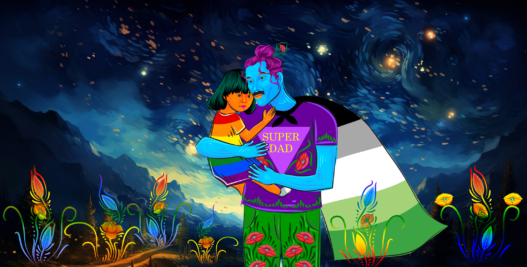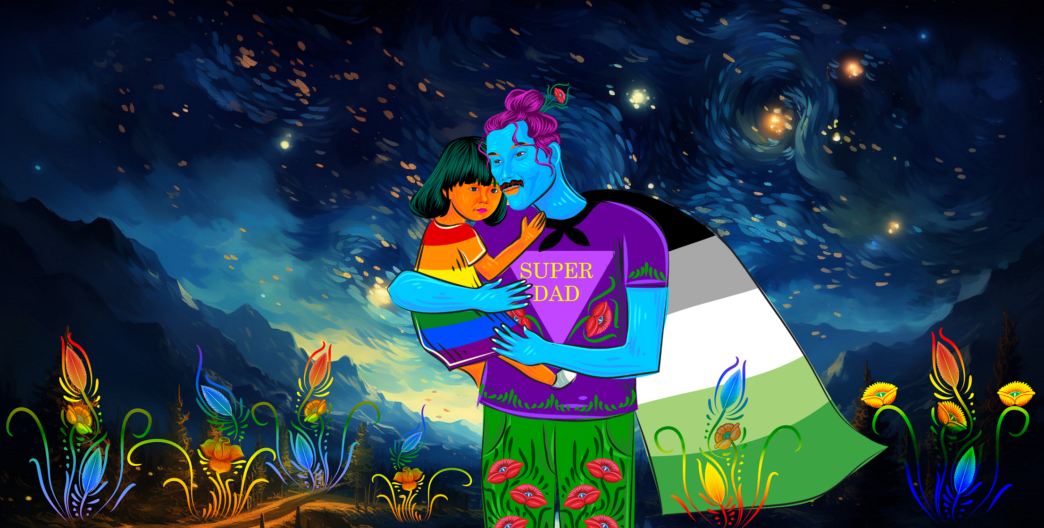A New Definition of Companionship
The phone buzzed insistently in Phatthara’s pocket. He hesitated before answering, knowing it was likely another call from his mom pushing yet another marriage proposal to a young university girl. But when he saw the name on the screen and cut the call — through Phatthara’s curtains as he sat at his desk, staring at the rejection letter. The words swirled on the page like a cruel taunt: “A child needs a mother’s care. Your application has been denied.”
Phatthara leaned back, his chest tightening. A lifetime of resilience seemed to falter in that moment. The fight for his identity as an intersex, asexual man had been exhausting, but this—this was a different kind of pain. It wasn’t just about him anymore. It was about the child who deserved love, and the chance to give it.
He closed his eyes and thought of 4 years old Deedy, the girl he had met at the orphanage during a state visit. Deedy’s wide, cautious eyes had softened when Phatthara knelt beside him, asking about the vibrant drawings scattered on the floor. The girl had smiled—a rare, fleeting moment of trust. That smile had lit something in Phatthara’s heart, something he hadn’t known was possible.
But now, that smile felt out of reach.
The phone on his desk buzzed. Phatthara ignored it at first, but the persistent vibrations forced his hand. He sighed, half-expecting yet another relative asking why he hadn’t settled down or tried harder to “fit in.” But the voice on the other end startled him.
“Phatthara?” It was a legal advocate he had contacted weeks ago, a faint thread of hope he had nearly forgotten. “I’ve read your story. I think we can challenge this.”
Phatthara sat up straight. “You mean… there’s a chance?”
“It’s a long road,” the advocate said. “But you have a case. The laws are discriminatory, and with enough visibility, we can push for reform. Are you ready for a fight?”
He hesitated. Was he? Years of being told he didn’t belong in the binaries of gender, attraction, or family had left scars. Yet, as he thought of Deedy’s drawings—bright, unbridled bursts of color—something clicked. He had to try. For himself. For Deedy. For every child waiting in the shadows of a flawed system.
“Yes,” he said. “I’m ready.”
The weeks that followed were a whirlwind of determination and doubt. Phatthara became an advocate, not just for his own dream of parenthood, but for a system that needed to change. He shared his story in articles, gave interviews, and met with policymakers. His piece, Parenthood beyond Gender: An Intersex Man’s Fight for Love, went viral, sparking conversations about what it truly
Support poured in from unexpected places—queer activists, single parents, and even foster care workers who had long known the system was failing children. But there were also detractors: politicians clinging to “traditional” family values, and strangers who hurled insults at him online. Each hateful word cut deep, but Phatthara clung to the voices of support like a lifeline.
One day, he received a letter that brought him to tears. It was from Deedy’s caretaker at the orphanage.
“Deedy asks about you,” the letter read. “He still remembers the man who listened to him talk about his art. I hope you don’t give up. He needs someone like you.”
Phatthara’s resolve hardened. The fight was no longer just about his right to adopt—it was about proving that love, care, and commitment mattered more than the labels society placed on people.
Months turned into years. Phatthara’s case became a landmark in the fight for adoption reform in his own country. His advocacy inspired a movement, forcing the government to reconsider laws that excluded single men and queer individuals from the possibility of parenthood.
When the day finally came—when the court ruled in his favor. Phatthara could barely breathe.
He returned to the orphanage, his heart pounding as he walked through its gates. Deedy was sitting cross-legged on the floor, drawing. When he looked up and saw Phatthara, his face broke into that same, radiant smile.
“Are you here to take me home?” Deedy asked.
Phatthara knelt down, his voice trembling. “Yes, Deedy. I’m here to take you home.”
Deedy has become the best companion in Phatthara’s once lonely life. Together, they create their own world, redefining family norms with love and care.
And in that moment, every rejection, every battle, and every sleepless night felt worth it. Phatthara had won not just the right to be a parent, but the chance to rewrite what family meant—for himself, for Deedy, and for anyone else daring to dream beyond the confines of gender and tradition.
This story is purely a work of fiction.
















